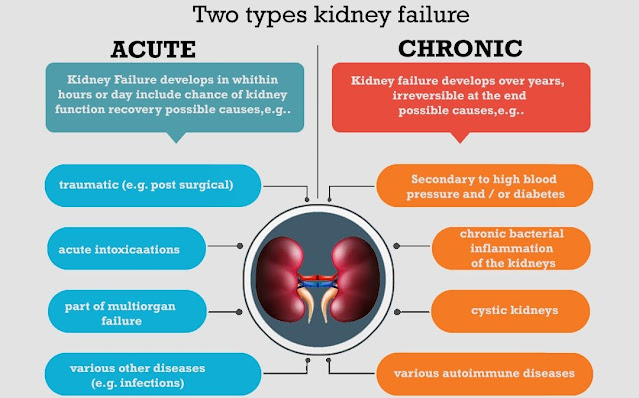Discover the Importance of Regular Kidney Function Tests: Symptoms, Types, and Prevention.
Kidney function tests are a group of tests that check how well the kidneys are working. The kidneys are important organs that perform several crucial functions in the body, such as filtering waste and excess fluid from the blood, regulating the balance of electrolytes, producing hormones that regulate red blood cell production and control blood pressure, and more. Regular kidney function tests help detect problems early on and monitor the effectiveness of any treatment.
Kidney function tests typically involve measuring the levels
of certain substances in the blood and urine that are indicative of how well
the kidneys are functioning. Some of the most common tests include creatinine
tests, blood urea nitrogen (BUN) tests, uric acid tests, and urine
creatinine tests. In some cases, imaging tests such as ultrasound, CT scans,
and MRI may also be performed to provide a more comprehensive picture of the
kidneys' structure and function.
Anatomy and physiology of the kidneys
The anatomy and physiology of the kidneys is complex, but
understanding the basics can help us appreciate the importance of keeping these
organs in good health. The kidneys are located in the lower back, on either
side of the spine. They are bean-shaped organs, about the size of a fist, and
they play several crucial roles in the body.
One of the most important functions of the kidneys is
filtering waste and excess fluid from the blood. The kidneys are equipped with
tiny filters called nephrons, which remove waste products and excess fluids
from the bloodstream and pass them into the urine. This process helps keep the blood
clean and free of harmful substances.
The kidneys also play a crucial role in regulating the balance of electrolytes in the body, such as sodium, potassium, and calcium. They produce hormones that regulate red blood cell production, control blood pressure, and promote bone health. They also help regulate the body's fluid balance and activate vitamin D, which is necessary for strong bones.
Types of kidney function tests
Kidney function tests are a group of tests that are used to
assess the health of the kidneys and detect any problems that may be affecting
their ability to function properly. Some of the most common types of kidney
function tests include:
Creatinine Test: This test measures the level of creatinine
in the blood, which is a waste product produced by muscle metabolism. High
levels of creatinine can indicate that the kidneys are not functioning
properly.
Blood Urea Nitrogen (BUN) Test: This test measures the level
of urea nitrogen in the blood, which is another waste product produced by the
breakdown of protein. High levels of urea nitrogen can indicate that the
kidneys are not functioning properly or that there is dehydration.
Uric Acid Test: This test measures the level of uric acid in
the blood, which is a waste product produced by the breakdown of purines. High
levels of uric acid can indicate that the kidneys are not functioning properly
or that there is a problem with the elimination of uric acid.
Chronic Kidney Disease & Kidney Failure: Common Symptoms
Chronic Kidney Disease (CKD) and Kidney Failure are two
serious conditions that can occur as a result of damage to the kidneys. CKD is
a long-term, progressive condition in which the kidneys gradually lose their
ability to function effectively. Kidney Failure, on the other hand, is a more
advanced stage of CKD in which the kidneys have stopped functioning altogether.
Common symptoms of CKD and Kidney Failure include
- Fatigue and weakness
- Swelling in the legs, ankles, and feet
- Changes in urination, including reduced frequency and amount, or foamy or dark urine
- Nausea and vomiting
- Loss of appetite
- Dry, itchy skin
- Muscle cramps and twitching
- Trouble sleeping
- Concentration and memory problems
It's important to note that these symptoms can be caused by
other conditions as well, and that many people with early-stage CKD may not
experience any symptoms at all. That's why regular kidney function tests are so
important. They can help detect any problems early, when they are still treatable
and reversible.
If you are experiencing any of these symptoms, it's important to speak with your doctor to determine the cause and the best course of action. Early detection and proper treatment can help preserve kidney function and prevent further complications.
For appointments / Home Collection
Call / Whatsapp - 9112258900






Comments
Post a Comment